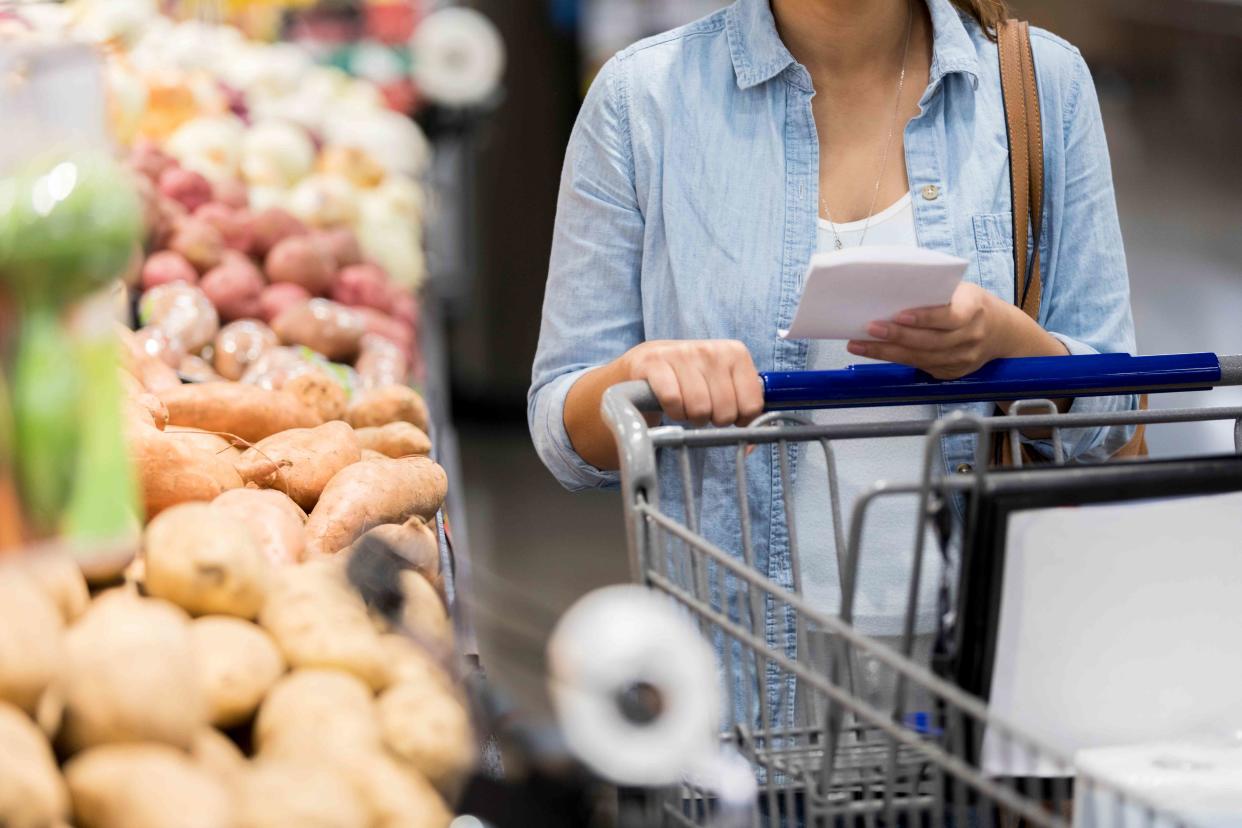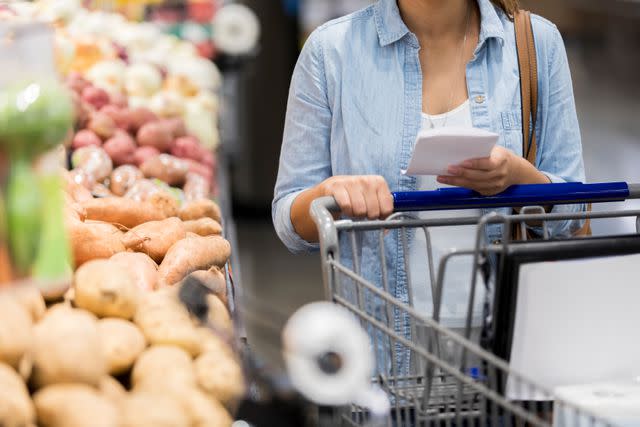Can ChatGPT Make Your Meal Plans? Dietitians Discuss Pros and Cons

Getty Images / SDI Productions
Fact checked by Nick Blackmer
Recently, individuals have begun sharing their custom-made meal plans, created using ChatGPT.
When tested, our registered dietitian found the meal plans to technically meet the criteria from a nutrition standpoint—but they were lacking in flavor, variety, and beverages and desserts.
Experts note that while it may seem convenient, individuals with specific medical needs and goals are better off seeking help from a registered dietitian.
In an effort to use ChatGPT in every aspect of life, some people have begun asking the artificial intelligence (AI) application to curate meal plans and grocery lists.
As researchers hone the precision and clarity of AI chatbots like ChatGPT, these tools are increasingly able to respond to highly detailed requests—including making custom meal plans. In recent weeks, the internet has surged with success stories of people using ChatGPT to outline tailor-made meals for all manners of specifications.
Though the bot’s official terms say that “it is not intended to give advice,” ChatGPT’s programming appears willing to do just that.
When asked whether it can create a custom meal plan, ChatGPT cheerfully responds with “Certainly!”
But can artificial intelligence really create appropriate meal plans for anyone and everyone? And are there dangers in relying on AI to guide your diet if you have a health condition that requires dietary modification?
Here’s a look at when ChatGPT can be a useful tool for guiding your eating, and when to stick to advice from a real, qualified human—preferably a registered dietitian.

Getty Images / SDI Productions
ChatGPT Meal Plans
ChatGPT and other AI bots can create meal plans—even customized ones that account for your dietary preferences, calorie needs, height, weight, age, gender, and health goals. In fact, the bot immediately requests this information when prompted to make a meal plan.
The question, of course, is whether it can do so well. When asked to create a 1,500-calorie cardiac diet for a 60-year-old woman, for example, ChatGPT duly spits out a seven-day plan for three meals and two snacks per day. The plan fits heart-healthy criteria for plenty of fruits and vegetables, whole grains, lean proteins, and other foods low in sodium, saturated fat, and added sugars.
However, a quick scan of the meals and snacks provided reveals some striking drawbacks. ChatGPT’s seven-day cardiac diet—and other diets tested—are glaringly low in variety. Heart-healthy snacks alternate between one small apple, one small orange, or one small nonfat yogurt—nothing else all week long.
Similarly, each dinner follows a predictable pattern of one lean protein, one roasted or steamed vegetable, and one serving of starch. No suggestions are given for making these meals palatable by adding seasonings or other flavors.
Then again, if there are flavors or cuisines you enjoy, you can tell the bot your preferences and it will accommodate them.
Meanwhile, the bot’s seven-day plans feature no beverages or sweet treats, even when prompted to create meals intended for weight gain. Beverages are an important part of any meal plan, and many health experts stress that treating yourself to an occasional dessert is okay (and even necessary) for sticking with a diet.
Again, if you’d like sweets, drinks, or any other food to make an appearance on your meal plan, you’ll have to tell ChatGPT specifically.
Related:Best Whole30 Meal Delivery Services
Making the Most of ChatGPT for Meal Planning
Until ChatGPT’s interface becomes more sophisticated, it’s not ideal for hammering out the nitty-gritty of your daily eating. But it could have its place in your overall dietary toolkit.
“ChatGPT can be an incredibly helpful tool for gathering meal ideas, creating grocery lists, and adding more nutrient-dense foods to your life,” Miranda Galati, MHSc, RD, founder of Real Life Nutritionist, told Health.
“For generally healthy people looking to eat up their nutrition and get more variety in their diet, I think it’s great.”
Even if you don’t follow ChatGPT’s meal plans to a tee, they could be useful for providing a broad-strokes understanding of certain diets.
If you’re looking for an outline of what a low-carb vegetarian diet might look like, for example, or how to achieve 2,000 calories on a keto diet, you might use ChatGPT’s meal plans as a jumping-off point. The tool can even create grocery lists based on recipe URLs (though it doesn’t specify quantities of ingredients). And when prompted for suggestions of foods to eat for specific nutrients, it willingly obliges.
The Drawbacks of Using ChatGPT for Meal Planning
Much like the internet in its early days, ChatGPT has some kinks to work out before it becomes a fully trustworthy dietary resource. Many of the sources it draws from are dubious at best.
“ChatGPT is great at gathering and consolidating information, but not so great at vetting its sources. And it’s not so great at citing those sources either,” Galati pointed out. “Because ChatGPT pulls information from all over the internet, you don’t know if you’re getting information from a credible source or a questionable one.”
Additionally, ChatGPT’s reach only extends through 2021, so it’s not up to speed on the latest research around food and health, Lisa Andrews, MEd, RD, LD, owner of Sound Bites Nutrition, told Health.
Andrews also noted that ChatGPT doesn’t have a crystal ball into your current eating habits—an important factor in meal planning. “It’s not able to obtain a diet history from you to suggest changes in your diet. It can’t evaluate what you’re already eating,” she said.
Some have pointed out that the AI tool will respond to any query, giving dietary information for health conditions that have no known connection to diet.
Ask the bot to give you a meal plan for literally any goal—we tried “give me a meal plan for smaller ears”—and you shall receive. Though ChatGPT provides a disclaimer that no foods have been connected to smaller ears, it still creates a “healthy” meal plan which it states “may indirectly contribute to feelings of self-confidence and body positivity.” Absurd as it may seem, it’s one example of the confusion ChatGPT may create around diet and health.
According to Galati, this confusion is a major issue underlying turning to AI for dietary advice. “The average person will have a hard time confirming whether that meal plan is truly safe and healthy for their unique circumstances,” she said. “That’s the biggest risk.”
Andrews added that the potential for error lies not only in the bot itself, but in the way people may use it. “Users may request meal plans that are not appropriate for them,” she said. “For example, a person with diabetes may also have underlying renal (kidney) disease. A bot would not be able to pick that up from a meal plan request.”
When to Consult a Dietitian
As useful as AI may be in certain circumstances, so far it can’t replace the wisdom and understanding of a trained nutrition professional. This is especially true for medical conditions.
“For medical nutrition therapy for specific medical conditions, I’d seek the help of an RD. I like to say RD stands for ‘Real Deal,’” Andrews said.
Galati emphasized the importance of human connection in creating the very best meal plans for your health and well-being.
“Dietitians will take the time to understand and accommodate your physical health history, mental health struggles, likes, dislikes, lifestyle, and goals,” she concluded. “They don’t just provide meal ideas; dietitians are trained to understand and guide you as an individual. They’ll help you learn how to stick with the changes you’re making to truly transform your health long-term.”
Related:How To Build a Great Weight Loss Grocery List
For more Health news, make sure to sign up for our newsletter!
Read the original article on Health.

